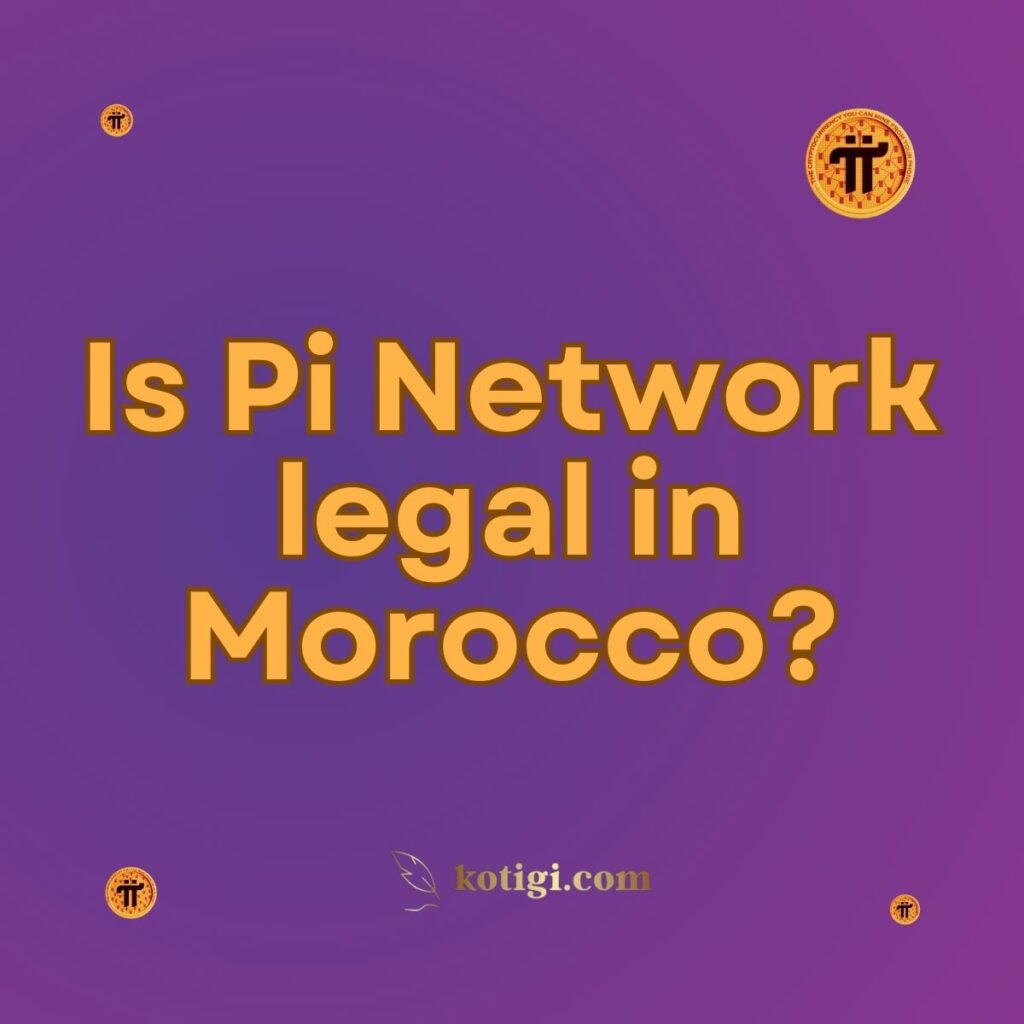
Is Pi Network legal in Morocco?
In Morocco, Pi Network operates in a legal gray area, as the country has banned the use of cryptocurrencies since 2017. While Pi Network is not explicitly mentioned in Moroccan regulations, the general ban on cryptocurrency transactions raises potential risks for users. Participants in Pi Network should be cautious, as Moroccan authorities maintain a strict stance on the use of digital currencies.
Introduction
The global rise of cryptocurrencies has sparked interest in decentralized networks like Pi Network. However, legal frameworks around cryptocurrencies vary widely, and in Morocco, the situation is particularly stringent. Morocco has maintained a ban on cryptocurrency transactions since 2017, and while Pi Network operates differently from traditional cryptocurrencies, it still falls into a regulatory gray area. In this article, we will explore the legal status of Pi Network in Morocco and what this means for users who are interested in mining and trading Pi coins.
1. Morocco’s Ban on Cryptocurrencies
In 2017, Morocco’s Office des Changes (Exchange Office) issued a public warning against the use of cryptocurrencies, effectively banning their use for transactions in the country. This decision has had significant implications for digital currency platforms like Pi Network.
1.1 The 2017 Ban and Its Implications
The 2017 ban on cryptocurrencies in Morocco prohibits the use of digital currencies for transactions, citing concerns about financial instability and the potential for illegal activities, such as money laundering. While this ban specifically targets Bitcoin and similar cryptocurrencies, it creates uncertainty for Pi Network users, as Pi operates under a similar decentralized model.
1.2 The Scope of the Ban
The Moroccan government’s ban covers both the use and promotion of cryptocurrencies within the country. This includes buying, selling, and exchanging digital currencies, making it risky for users to engage in Pi Network activities, particularly when it comes to trading Pi coins for goods or services.
1.3 Enforcement of the Ban
Although the ban is in place, enforcement has been inconsistent. While authorities have not pursued individual users aggressively, those involved in large-scale cryptocurrency transactions may face legal consequences. This puts Pi Network participants at risk if the platform’s usage grows in Morocco.
2. Pi Network’s Legal Status in Morocco
As Pi Network continues to grow, Moroccan users must navigate a complex legal environment. Despite its unique approach to mining and currency distribution, Pi Network still operates under the broad umbrella of cryptocurrencies, which are banned in Morocco.
2.1 Pi Network’s Position in the Cryptocurrency Ecosystem
Pi Network distinguishes itself from traditional cryptocurrencies through its mobile-first, energy-efficient mining process. However, the Moroccan government does not make distinctions between different types of cryptocurrencies, and the ban applies broadly to digital currencies, including platforms like Pi Network.
2.2 The Legal Gray Area for Pi Network
While Pi Network does not facilitate direct financial transactions in the same way as Bitcoin or Ethereum, its decentralized nature and future plans for enabling exchanges of Pi coins may raise legal questions in Morocco. Until Moroccan authorities clarify their stance on platforms like Pi, users should proceed with caution.
2.3 Potential Legal Risks for Users
Pi Network users in Morocco face potential legal risks, especially if they attempt to convert Pi coins into fiat currency or use them for transactions. The Moroccan government has demonstrated a strict approach to cryptocurrency regulation, and participating in Pi Network could expose users to legal action if the platform becomes more widely scrutinized.
3. Government’s Concerns about Cryptocurrencies
The Moroccan government’s firm stance against cryptocurrencies is driven by concerns over economic instability, money laundering, and consumer protection. These concerns also influence how the government views Pi Network.
3.1 Economic Stability and Financial Control
One of the primary reasons for Morocco’s ban on cryptocurrencies is the government’s desire to maintain control over the country’s financial system. Cryptocurrencies, by their decentralized nature, operate outside of the traditional banking system, which could undermine Morocco’s monetary policies and economic stability. This concern applies to Pi Network as well, particularly as the platform gains popularity.
3.2 Risks of Fraud and Money Laundering
Moroccan authorities have cited the potential for fraud and money laundering as key reasons for banning cryptocurrencies. Since Pi Network is not yet fully operational in terms of enabling transactions, these concerns may not be as pressing for now. However, as Pi Network moves closer to enabling users to trade Pi coins, these risks could become more relevant in the eyes of Moroccan regulators.
3.3 Consumer Protection
Another major concern for the Moroccan government is the protection of consumers from the high volatility and speculative nature of cryptocurrencies. While Pi Network has a unique structure, the future value of Pi coins remains uncertain, and users could potentially face losses. This uncertainty reinforces the government’s cautious approach to digital currencies.
4. Potential Consequences for Pi Network Users in Morocco
Although Pi Network is not explicitly banned in Morocco, the country’s strict stance on cryptocurrencies creates several potential risks for users who engage with the platform.
4.1 Fines and Legal Penalties
Users who attempt to trade Pi coins or engage in cryptocurrency transactions in Morocco could face fines or legal penalties, depending on the scale of their activities. The Moroccan government has made it clear that cryptocurrency transactions are illegal, and Pi Network users should be mindful of the potential consequences.
4.2 Challenges in Converting Pi Coins to Fiat Currency
One of the key challenges for Pi Network users in Morocco is the difficulty in converting Pi coins into Moroccan Dirhams (MAD). Since the use of cryptocurrencies for financial transactions is illegal, Moroccan users may face barriers when attempting to exchange Pi for traditional currency, either within the country or through international platforms.
4.3 Increased Scrutiny from Authorities
As Pi Network continues to grow, Moroccan authorities may begin to scrutinize the platform more closely. This could lead to increased enforcement of cryptocurrency regulations, making it riskier for users to participate in Pi Network activities, especially as the platform moves toward enabling Pi coin transactions.
5. Future of Cryptocurrency Regulation in Morocco
While the current legal environment in Morocco is hostile to cryptocurrencies, future developments in global and regional regulation could influence the country’s stance on platforms like Pi Network.
5.1 Possibility of Regulatory Changes
As cryptocurrencies continue to evolve and gain acceptance in other parts of the world, there is a possibility that Morocco may reconsider its strict stance. If the government sees potential benefits from blockchain technology and digital currencies, it could introduce a regulatory framework that allows for controlled use of platforms like Pi Network.
5.2 Regional Trends in Cryptocurrency Regulation
Morocco’s position on cryptocurrencies is influenced by regional trends, particularly within the Middle East and North Africa (MENA) region. As neighboring countries explore the possibilities of regulating cryptocurrencies, Morocco may eventually follow suit. This could open the door for platforms like Pi Network to operate legally, provided they meet certain regulatory requirements.
5.3 International Influence on Cryptocurrency Policies
International pressure from organizations like the Financial Action Task Force (FATF) and global financial institutions may also impact Morocco’s approach to cryptocurrency regulation. If global standards for regulating cryptocurrencies become more established, Morocco may adapt its policies to align with international best practices, potentially offering more legal clarity for Pi Network users.
6. Safeguards for Moroccan Pi Network Users
While the legal status of Pi Network in Morocco remains uncertain, there are steps that users can take to protect themselves and minimize potential risks.
6.1 Staying Informed About Legal Developments
Given the dynamic nature of cryptocurrency regulation, it is crucial for Moroccan Pi Network users to stay informed about any changes in the legal environment. By keeping up with government announcements and regulatory updates, users can make more informed decisions about their participation in the platform.
6.2 Avoiding Large-Scale Transactions
To minimize legal risks, Moroccan Pi Network users should avoid engaging in large-scale transactions involving Pi coins. While it is currently possible to mine Pi and hold Pi coins, users should be cautious about trading or converting Pi coins until there is greater legal clarity.
6.3 Seeking Legal Advice
For users who are concerned about the legal implications of participating in Pi Network, seeking legal advice from professionals familiar with Moroccan cryptocurrency laws is a prudent step. Legal experts can provide guidance on how to navigate the complex regulatory environment and mitigate potential risks.
Conclusion
In Morocco, Pi Network exists in a legal gray area due to the country’s strict stance on cryptocurrencies. While the platform is not explicitly banned, the general prohibition on cryptocurrency transactions puts users at risk of legal consequences. As the platform evolves and as global trends in cryptocurrency regulation continue to shift, the legal status of Pi Network in Morocco may change. Until then, users should proceed with caution and stay informed about potential legal developments that could impact their participation in the network.
Key Takeaways
- Morocco has banned cryptocurrency transactions since 2017, placing Pi Network in a legal gray area.
- Users should be cautious, as engaging in cryptocurrency transactions, including with Pi coins, may lead to legal risks.
- Pi Network’s decentralized nature aligns it with other cryptocurrencies, making it subject to Morocco’s broad cryptocurrency ban.
- The future of cryptocurrency regulation in Morocco is uncertain, and users should stay informed about any legal changes.
- Moroccan users of Pi Network should avoid large-scale transactions and seek legal advice to mitigate potential risks.





